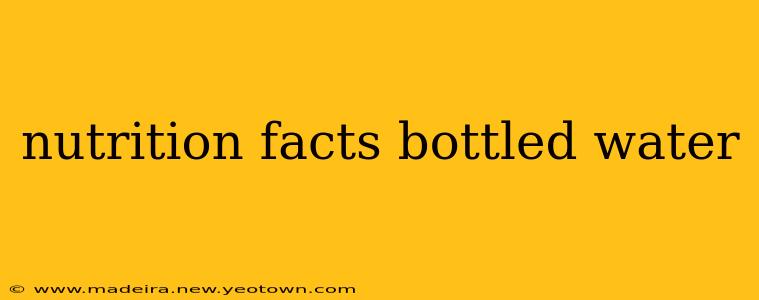Let's be honest, when you grab a bottle of water, the last thing on your mind is checking the nutrition label. After all, it's water, right? Pure, refreshing H₂O? While mostly true, there are nuances to understand, especially if you're health-conscious or have specific dietary needs. This journey through the often-overlooked world of bottled water nutrition facts will illuminate some surprising details.
What are the basic nutrition facts for bottled water?
The beauty (and simplicity) of bottled water's nutritional information lies in its near-absence. A standard nutrition label for pure bottled water will show virtually zero calories, fat, carbohydrates, protein, or sugars. It’s essentially a blank slate, reflecting the purity of the water itself. This is why it's a go-to beverage for those watching their calorie intake or following specific dietary restrictions.
However, not all bottled waters are created equal. Some may contain added minerals, electrolytes, or even flavors, which will alter the nutritional profile. Always read the label carefully!
Does bottled water have any minerals?
This depends entirely on the source and type of bottled water. Many brands proudly boast naturally occurring minerals like magnesium, calcium, and potassium. These minerals are naturally present in the water source and aren't added artificially. However, the amounts are generally minimal, contributing insignificantly to your daily mineral intake. "Mineral water," specifically, is legally required to have a certain mineral content, which will be clearly stated on the label.
Conversely, purified or distilled water typically undergoes a process that removes most minerals. So, if you're aiming for a mineral boost, choose a mineral water and check the label to see the specific mineral content.
Are there any calories in bottled water?
Generally, no. Plain bottled water is essentially calorie-free. The negligible caloric content might be present due to trace minerals but is so insignificant that it's essentially zero. However, this changes if the water has added flavors, sugars, or other ingredients. Flavored waters, sports drinks, and enhanced waters often contain added sugars and calories, so it’s crucial to check the label.
What about sodium in bottled water?
Similar to minerals and calories, the sodium content in bottled water varies greatly depending on the source and treatment. Plain bottled water usually has negligible amounts of sodium. However, mineral water might contain some sodium naturally present in the water source. Again, check the label to understand the sodium content precisely. This is particularly relevant for individuals on low-sodium diets.
Does the type of bottle affect the nutritional content?
No, the type of bottle itself (plastic, glass, etc.) doesn't directly affect the nutritional content of the water inside. However, concerns exist regarding potential leaching of chemicals from certain plastic bottles into the water, especially with prolonged storage or exposure to heat. This is a concern related to safety and potential chemical exposure, rather than the nutritional profile.
What should I look for on a bottled water label?
The most important information to find on a bottled water label includes:
- Source of water: Knowing the origin (spring, purified, well, etc.) gives you insight into the potential mineral content.
- Mineral content (if any): A detailed list of minerals and their quantities allows you to make informed choices if you're seeking specific minerals.
- Added ingredients: This is crucial for avoiding added sugars or other substances that might affect your dietary goals.
- Serving size: Understand how much water is in each bottle for accurate hydration tracking.
Ultimately, while the nutrition facts for plain bottled water are typically minimal, understanding the variations based on source and added ingredients is vital for making conscious choices aligning with your individual health needs. Remember, reading the label is your best tool for navigating the world of bottled water!

